When it comes to physical fitness, it’s well-known that consistent exercise is key for the strength of our bodies. In 2023, we’ll see an increasing awareness that taking a similar approach—one that’s regular and proactive—makes for a healthier mind. “Mental fitness is like physical fitness, where you’re engaging in mind-body strategies, like meditation, regularly,” says therapist Allyson Byers, AMFT. “This results in being able to better handle life’s challenges and more days in which you’re performing your best.”
While many mental fitness offerings won’t (and shouldn’t) take the place of traditional psychotherapy or medication, they provide stressed-out and struggling Americans with more tools to fill their mental well-being care kits that suit their individual needs, schedules, preferences, and budgets—at the tap of a screen.
More and more people are interested in looking after their mental well-being on a daily basis. Use of the term “mental fitness” has exploded on social media, with #mentalfitness currently at 387,000 posts on Instagram (and more than 100,000 of these uses on Instagram happened in 2022), and #mentalfitness on TikTok landing at an impressive 58.5 million views—increasing 575 percent from 2021 to 2022. But concern about mental well-being isn’t just a social media thing: Market research firm Fact.MR projects the global mental fitness apps market to be worth $1.9 billion by 2031 (growing at a rate of over 16 percent each year), with demand for apps that treat co-occurring disorders nearly doubling in the past five years.
The surging interest in mental fitness has influenced several recent brand launches, including Wondermind, a media company that launched in April with the phrase “the world’s first mental fitness ecosystem” as its tagline. The brand’s co-founders—actor and advocate Selena Gomez, Mandy Teefey (Gomez’s mother), and media entrepreneur Daniella Pierson—wanted to create a space that helped destigmatize mental health conditions while also providing tangible solutions for readers and users. “Mental fitness means working on your mental health—whatever that looks like to you,” says Casey Gueren, head of content for Wondermind. “People often think about mental health as something that you focus on only when you're in crisis, rather than as a crucial part of how you show up in the world. However, taking care of your mental health doesn't have to be expensive, inaccessible, or time-consuming.”
The brand’s first drop was the Wondermind newsletter: Three times each week, actionable tips and helpful resources are delivered to your inbox to remind you that you are not alone in your mental health journey. The second release came in October with the launch of Wondermind.com, an editorial content hub filled with expert-backed articles and exclusive celebrity interviews that aim to “change the way you take care of your mental and emotional health.” A podcast—The Business of Feelings, which profiles the emotional journeys and challenges of successful public figures (guests include gymnast Aly Raisman and poet Rupi Kaur)—soon followed. To date, the months-old brand currently boasts over 200,000 Instagram followers and 50,000 Twitter followers—and is currently valued at $100 million.
“People often think about mental health as something that you focus on only when you're in crisis, rather than as a crucial part of how you show up in the world. However, taking care of your mental health doesn't have to be expensive, inaccessible, or time-consuming.” Casey Gueren, head of content for Wondermind
“Whether you're lucky enough to be able to see a therapist or not, there are so many ways to show up for your mental and emotional well-being on a regular basis,” says Gueren. “We want everyone to have access to expert-backed mental health information that they can trust and that feels relatable, relevant, and actually doable.” With a recently-acquired $5 million Series A funding, Wondermind plans to ramp up efforts to reach even more consumers in 2023. Though the team is keeping tight-lipped on solidified plans beyond its current scope, the company is reportedly laying the foundation for a production arm (as in, TV and film productions) and also plans on launching a product line in collaboration with mental health professionals to “make tangible progress on their own mental fitness,” co-founder Pierson told WWD.
This same idea of showing up proactively for your mental health fueled Hailey O’Neill to create MindBar. The Austin-based entrepreneur found herself out of a job and out of a relationship just a week before her 30th birthday. After having a difficult time searching for a therapist, O’Neill was inspired to apply the ClassPass aggregation model to mental well-being resources: “I kept thinking, why do we have this rich community and all these options when it comes to physical health, like these different classes? But when it comes to mental health, it's: You're on your own, you're on an island, it's $150 an hour, and that's that,” she says.
O’Neill launched MindBar at the beginning of 2020 as a series of mental health pop-ups offering practitioner-led discussions on different topics like stress. When COVID-19 hit, she pivoted to online, where she saw the interest in mental health topics grow. In 2022, she decided to launch a MindBar site, which makes pre-recorded modules by therapists and coaches in eight different categories—such as stress and anxiety and self-talk—available to users for a low membership monthly fee ($14.99, or $115 for the whole year). Members have access to classes, course guides, and workbooks, which they can go through at their own pace. Users can also schedule an individual session with a therapist or practitioner, should they want.
Currently, O’Neill is working on fundraising and hopes to raise $1 million by 2023. In January 2023, the brand will launch cohorts, live group classes of about eight people that will be held over Zoom every other week for three months. O’Neill also wants to return to having in-person meet-ups, and has big ideas for employer offerings down the line.
